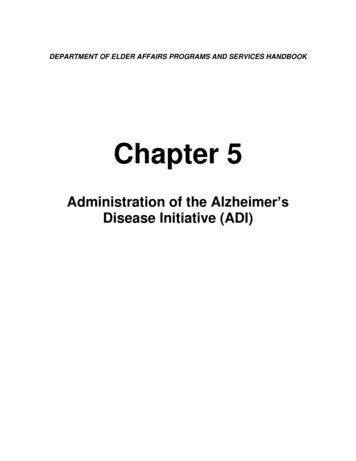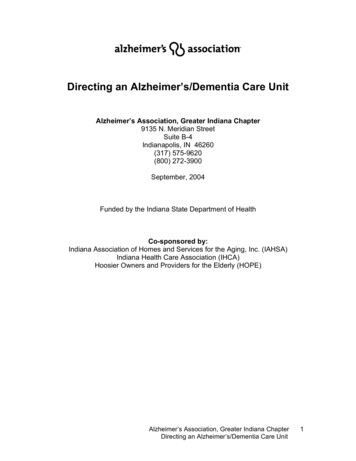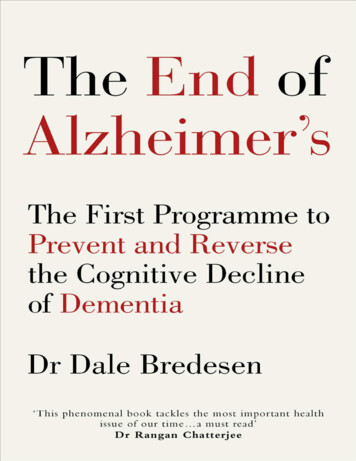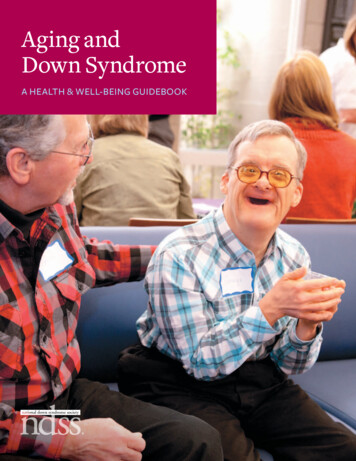
Transcription
DEPARTMENT OF ELDER AFFAIRS PROGRAMS AND SERVICES HANDBOOKChapter 5Administration of the Alzheimer’sDisease Initiative (ADI)
DEPARTMENT OF ELDER AFFAIRS PROGRAMS AND SERVICES HANDBOOKChapter 5: Alzheimer’s Disease Initiative (ADI)TABLE OF CONTENTSSectionTopicI.Purpose of the ADI Program5-3II.Legal Basis and History, Specific Legal Authority5-4III.Alzheimer’s Disease Characteristics5-6IV.Services Provided Under the ADI Program5-9V.Program RequirementsA.February 2020Page5-14Department of Elder Affairs (DOEA), Area Agencieson Aging (AAA), and Service Provider Responsibilities5-14B.Coordination of ServicesC.Establishing Priorities for Service Provisions5-20D.Co-Payment Assessment5-21E.Grievance Proceedings5-215-25-17
DEPARTMENT OF ELDER AFFAIRS PROGRAMS AND SERVICES HANDBOOKChapter 5: Alzheimer’s Disease Initiative (ADI)Section I: PurposePURPOSE OF ADI PROGRAM:A.Chapter Contents: This chapter provides program policies, standards andprocedures for use by the state office and all providers in the conduct of theAlzheimer’s Disease Initiative (ADI) programB.Purpose: The purpose of the ADI is the following:C.1.Special Needs: To address the special needs of clients with Alzheimer’sdisease (AD) or related memory disorders, as well as their caregivers; and2.Cure: To find through research the cause, treatment and ultimately a curefor AD or related memory disorders.ADI Program Components: The ADI is composed of the following programcomponents:1.Memory disorder clinics;2.Specialized Alzheimer’s Services Adult Day Care Centers;3.Respite care; and4.The brain bank located at the Wein Center for Alzheimer’s Disease andMemory Disorders at Mt. Sinai Medical Center.February 20205-3
DEPARTMENT OF ELDER AFFAIRS PROGRAMS AND SERVICES HANDBOOKChapter 5: Alzheimer’s Disease Initiative (ADI)Section II: Legal Basis and AuthorityLEGAL BASIS, HISTORY AND SPECIFIC LEGAL AUTHORITY:Legal Basis and History:A.B.Florida Statutes: The Florida Legislature enacted Sections 430.501 – 430.504,Florida Statutes. The Legislature demonstrated its recognition of the alarminglyhigh percentage of citizens (particularly those over age 65) affected byAlzheimer’s disease and other related memory disorders by creating thefollowing:1.An Alzheimer’s Disease Advisory Committee;2.The Alzheimer’s Disease Research Trust Fund;3.Respite care programs;4.Specialized Alzheimer’s Services Adult Day Care Centers;5.Four memory disorder clinics; and6.Through subsequent amendments:a.The brain bank located at the Wein Center for Alzheimer’s Diseaseand Memory Disorders at Mt. Sinai Medical Center; andb.Additional memory disorder clinics.Specific Legal Authority:Chapter 430.501-504, F.S.Chapter 58D-1, F.A.C.Chapter 429.918, F.S.C.ADI Program Funding: The ADI is a general revenue-funded program. Each yearthe level of funding is determined by the legislature during its budget process. Thestatute revision of 1988 established population factors to be included in an allocationformula for the distribution of respite care dollars.February 20205-4
DEPARTMENT OF ELDER AFFAIRS PROGRAMS AND SERVICES HANDBOOKChapter 5: Alzheimer’s Disease Initiative (ADI)Section II: Legal Basis and AuthorityD.ADI Service Eligibility:1.Service Eligibility Requirements: Individuals must be 18 years of age orolder and have a diagnosis of Alzheimer’s disease or a related memorydisorder or be suspected of having Alzheimer’s disease or a related memorydisorder.2.Specialized Alzheimer’s Services Adult Day Care EligibilityRequirements: Individuals must have a participant who has a documenteddiagnosis of Alzheimer’s disease or a dementia-related disorder (ADRD) froma licensed physician, licensed physician assistant, or a licensed advancedregistered nurse practitioner.3.Caregivers: Caregivers are also eligible to receive training, respite andrelated support services to assist them in caring for the ADI client.4.Clients MAY NOT be dually enrolled in the ADI program and a Medicaidcapitated long-term care program.February 20205-5
DEPARTMENT OF ELDER AFFAIRS PROGRAMS AND SERVICES HANDBOOKChapter 5: Alzheimer’s Disease Initiative (ADI)Section III: Alzheimer’s Disease CharacteristicsALZHEIMER’S DISEASE CHARACTERISTICS:A.Definition: Alzheimer’s disease (AD) affects the cells of the brain. It affectsindividuals from all socioeconomic levels. It produces a diminished capacity tothink or understand and perform activities of daily living.B.Related Disorders: Alzheimer’s disease is a type of dementia. Dementia is anumbrella term used to describe a group of diseases that may cause the brain tofail. Because Alzheimer’s disease is the most common cause of dementia, theterm is used to encompass the many types of dementia. Some of the more wellknown types of dementia that are referenced in this document every time theterm Alzheimer’s disease is used include, but are not limited to, the following:C.1.Multi-Infarct Dementia;2.Lewy Body Disease;3.Parkinson’s disease;4.Huntington’s disease;5.Creutzfeldt-Jakob disease;6.Pick’s disease; and7.Normal Pressure Hydrocephalus.a.Memory Loss: Memory loss, to the extent experienced by ADclients, is not a natural part of the aging process as was popularlybelieved in the past.b.Treatment: There is no treatment available to stop or reverse themental deterioration characteristic of AD. However, gains inresearch are occurring every year towards finding a cure.c.Diagnosis: A definitive diagnosis can only be made uponexamination of tissue from the whole brain at autopsy.Continuum of Care: AD clients require a wide continuum of care, from basicsupervision and assistance with activities of daily living (ADLs) to possibleplacement for skilled nursing care.February 20205-6
DEPARTMENT OF ELDER AFFAIRS PROGRAMS AND SERVICES HANDBOOKChapter 5: Alzheimer’s Disease Initiative (ADI)Section III: Alzheimer’s Disease Characteristics1.Impact on Caregivers: The nature of AD is such that the impact on thecaregivers is as great as the impact on the person with the disease. Thecaregiver of the AD client plays a key role in the prevention of prematureinstitutionalization of the AD client. Consequently, caregivers needservices to assist them in the continuation of care.2.Onset of Alzheimer’s Disease: In the early stages of the disease, the ADclient often experiences confusion, short-term memory impairment anddifficulty in performing familiar tasks.3.Impact on Caregiver at the Onset of the Disease: The caregiverassumes certain responsibilities at the onset of the disease, ensuring theAD client receives the following:4.February 2020a.Assistance in activities of daily living;b.A safe environment;c.Balanced meals;d.Required medications; ande.Instructions on how to complete routine functions.Disease Progression: As the disease progresses, the AD client may alsoexperience the following more advanced conditions:a.Becoming lost in familiar places;b.Personality change;c.Behavior change;d.Impaired judgment;e.Difficulty finding words or finishing thoughts; andf.Difficulty following directions.5-7
DEPARTMENT OF ELDER AFFAIRS PROGRAMS AND SERVICES HANDBOOKChapter 5: Alzheimer’s Disease Initiative (ADI)Section III: Alzheimer’s Disease Characteristics5.February 2020Impact on Caregiver as Disease Progresses: The ADI addresses theneeds of the caregiver as well as those of the client. The caregiver’s jobbecomes even more difficult and demanding as the disease progresses.When adequate services cannot be provided in the home, it may becomenecessary for the caregiver to consider placement outside of the home. Ifassisted living facility (ALF) or nursing home placement becomesnecessary, the caregiver may need assistance in the selection andplacement process.5-8
DEPARTMENT OF ELDER AFFAIRS PROGRAMS AND SERVICES HANDBOOKChapter 5: Alzheimer’s Disease Initiative (ADI)Section IV: Services Provided Under the ADI ProgramADI Services:A.State funds appropriated for ADI services must be used for services that supportand provide temporary relief from caregiving responsibilities for the ADI client’sprimary caregiver. These services are listed below. Case management is arequired service for in-home and facility-based respite. Co-payment can beassessed for all services below as per Department guidelines except Intake.Refer to Appendix A, “Service Descriptions and Standards,” for adescription of each service once an individual has been successfully screenedas eligible to receive ADI services.1.Caregiver Training/Support;2.Case Aide;3.Case Management;4.Counseling (Gerontological);5.Counseling (Mental .Specialized Alzheimer’s Services Adult Day Care Center;9.Respite (Facility-Based);10.Respite (In-Home);11.Specialized Medical Equipment, Services and Supplies; and12.Transportation.*Once Client is deemed eligible post screeningFebruary 20205-9
DEPARTMENT OF ELDER AFFAIRS PROGRAMS AND SERVICES HANDBOOKChapter 5: Alzheimer’s Disease Initiative (ADI)Section IV: Services Under the ADI ProgramB.Other ADI program components include:1.Memory Disorder Clinics (MDCs): MDCs must provide research, trainingand services directed to persons with symptoms of Alzheimer’s disease ora related dementia. MDCs provide the following service components:a.Memory Disorder Clinics provide comprehensive diagnostic andreferral services for persons with ADRD. ;i.Provide services to persons who are suspected of beingafflicted with ADRD.ii.Services include accepting referrals from all respite and serviceproviders and conducting subsequent diagnostic evaluations forall referred consumers and the public within the MemoryDisorders Clinic’s designated service area.iii. Individuals with suspected memory loss may be evaluated atany one of the funded memory disorder clinics. Florida residentsmay access MDC services regardless of the ability to pay.Memory Disorder Clinic locations can be found ap.pdfb.Conduct service-related applied research that may address, butis not limited to, therapeutic interventions and support servicesfor persons living with ADRD.i.c.February 2020MDCs shall initiate at least one contact with respite - providersannually to review progress relative to research efforts andexchange ideas with the providers.Training: The Memory Disorder Clinic will develop training materialsand educational opportunities for lay and professional caregivers whoserve individuals with ADRD and provide specialized training forcaregivers, caregiver groups, and organizations in the designatedservice area.5-10
DEPARTMENT OF ELDER AFFAIRS PROGRAMS AND SERVICES HANDBOOKChapter 5: Alzheimer’s Disease Initiative (ADI)Section IV: Services Provided Under the ADI Programi.Memory disorder clinics are required to provide a minimumof 4 hours in-service training related to Alzheimer’s diseaseannually in their designated service area for respite, infacility respite and adult day care providers, which willinclude health professionals and caregivers.ii.AAAs, memory disorder clinics, respite, and adult day careproviders must collaborate in the development of training tomeet staff needs.iii.A staff member of the Memory Disorder Clinic is to bedesignated to act as the training liaison for serviceproviders.Individuals with suspected memory loss may be evaluated at any one ofthe funded memory disorder clinics. Florida residents may access MDCservices regardless of the ability to pay. Memory Disorder Clinic locationscan be found at .pdf2.Alzheimer’s Disease Research Brain Bank: To be accepted into theFlorida Brain Bank program, there must be documentation of thediagnosis of dementia by the medical director of a state-funded MDC, orby another licensed neurologist, psychiatrist, or geriatric internist. Medicalrecords must also include general and neurological examinations,appropriate analyses, psychiatric assessments, hematological andbiochemical studies, and Computerized Tomography (CT) or a MagneticResonance Imaging (MRI) scan of the brain. There must be a completeddonor registration form and a request for post-mortem examination form.Candidates can be identified from:February 2020a.State-sponsored memory disorder clinics;b.Adult day care centers and respite care providers; andc.Local organizations providing services to clients with dementia andtheir families;d.Self-referral; ande.Bank Information: Information regarding the Brain Bank programand applications can be obtained from:5-11
DEPARTMENT OF ELDER AFFAIRS PROGRAMS AND SERVICES HANDBOOKChapter 5: Alzheimer’s Disease Initiative (ADI)Section IV Services Provided Under the ADI ProgramThe Wien Center for Alzheimer’s Disease and Memory DisordersMount Sinai Medical Center4300 Alton RoadMiami Beach, Florida 33140Phone: rainBank/about.php3.Brain Bank Activities: The brain bank performs the following activities:a.Autopsies on the brain tissue of AD clients and matching clinicaldata (obtained before a client’s death) with the pathologicalfindings. This is the only way to determine if the pre-morbidsymptoms, responses to treatment, and other factors suggesting adiagnosis of AD were in fact the responses of a client withAlzheimer’s disease.b.Provision of brain tissue for approved research projects on anational basis, with Florida projects receiving priority.c.Administration of the Brain Bank: The brain bank is administeredby the Mount Sinai Medical Center in Miami. The brain bank mustmeet all licensure requirements mandated by the State of Florida.d.Brain Bank Minimum Service Standards:e.February 2020i.Brain bank clients should be selectively screened prior todeath in accordance with established protocols.ii.The family should receive notification of definite diagnosis,written in clear understandable terms no later than 6 monthsafter autopsy.iii.In the case of familial Alzheimer’s disease, confirmation ofthe diagnosis in a family member carries with it anopportunity for genetic counseling.Regional Brain Bank Sites:Mt. Sinai Medical Center contracts annually with the State ofFlorida to operate the primary brain bank, and coordinate withregional brain bank sites in Orlando and Miami5-12
DEPARTMENT OF ELDER AFFAIRS PROGRAMS AND SERVICES HANDBOOKChapter 5: Alzheimer’s Disease Initiative (ADI)Section IV Services Provided Under the ADI Program4.Specialized Alzheimer’s Day Care: These are licensed specializedAlzheimer’s services adult day care centers, licensed in accordance withSection 429.918 F.S. FloridaHealthFinder.gov provides an up to datelisting of all Specialized Alzheimer’s Services Adult Day Care Centers.a.February 2020Specialized Alzheimer’s Services: Specialized Alzheimer’sservices include, but are not limited to, those listed below:i.Providing education and training on the specialized needs ofpersons with Alzheimer’s disease or related memorydisorders and caregivers;ii.Providing specialized activities that promote, maintain, orenhance the ADI client’s physical, cognitive, social, spiritual,or emotional health;iii.Providing therapeutic, behavioral, health, safety, andsecurity interventions; clinical care, and support services forthe ADI client and caregiver; andiv.Providing relief for the ADI client’s primary caregiver.5-13
DEPARTMENT OF ELDER AFFAIRS PROGRAMS AND SERVICES HANDBOOKChapter 5: Alzheimer’s Disease Initiative (ADI)Section V: Program RequirementsDOEA, AAA AND SERVICE PROVIDER RESPONSIBILITIES:A.B.DOEA Purpose and Responsibilities:1.Purpose: The purpose of DOEA in the ADI program is to plan, budget,coordinate and develop policy at the state level necessary to carry out thestatutory requirements for the ADI. Where allowed by statute, DOEA maychoose to directly administer a program component or may assign thisfunction to an AAA.2.Responsibilities:a.Allocation of Funds: Allocate ADI funds to AAAs for funding ofservice providers of adult day care and respite care programs;b.Contracting: Contract directly with the memory disorder clinics andbrain bank providers;c.Policies and Procedures: Establish policies and procedures forAAAs and ADI providers;d.Technical Assistance: Provide technical assistance on ADI;e.Evaluation: Evaluate the ADI program as required;f.Monitoring: Ensure quality of services through the monitoringprocess;g.Program Reports: Develop program reports as appropriate;h.Provider Applications: Prepare suggested format for the ADIprovider applications;i.Staff Development and Training: Ensure that ADI providers aregiven opportunities for staff development and training;j.Develop co-payment guidelines.Area Agency on Aging (AAA) Purpose and Responsibilities:1.February 2020Purpose: The purpose of the AAAs is to carry out policy, developprograms and monitor the ADI respite and day care programs.5-14
DEPARTMENT OF ELDER AFFAIRS PROGRAMS AND SERVICES HANDBOOKChapter 5: Alzheimer’s Disease Initiative (ADI)Section V: Program Requirements2.February 2020Responsibilities: The AAA has the following responsibilities:a.Competitive Solicitation: Establish subcontracts or vendoragreements, when applicable, for ADI services. Entitiesproviding direct services must be selected as the result of aprocurement decision using competitive or non-competitivemethod (i.e. sole source) to provide services pursuant to alegally executed agreement. Solicitation process must beconducted as applicable, in accordance with Chapter 287,Florida Statutes, and the AAA board approved procurementprocedures;b.Provider Application: Review and critique the ADI serviceprovider application to ensure completeness, accuracy and that allrevisions are noted;c.Administration and Monitoring: Administer and monitor ADIprogram policies and procedures;d.Program Reports: Ensure that all program reports are accuratelycompleted and submitted in a timely manner;e.Technical Assistance: Provide technical assistance to the ADIsubcontracts in program planning and development and ongoingoperations as needed;f.Staff Development and Training: Provide for AAA staffdevelopment and training;g.Contracting Responsibilities: Assume contractingresponsibilities, including review of the applicant’s subcontracts, ifapplicable;h.Provider Fiscal Assessment: Assess the fiscal managementcapabilities of the service providers;i.Performance Review: Review the performance of serviceproviders in carrying out their service delivery responsibilities;j.Processing: Process requests for payment and reports on receiptsand expenditures to DOEA;k.Technical Assistance: Provide technical assistance to providersto ensure provision of quality services;5-15
DEPARTMENT OF ELDER AFFAIRS PROGRAMS AND SERVICES HANDBOOKChapter 5: Alzheimer’s Disease Initiative (ADI)Section V: Program RequirementsC.l.CIRTS: Ensure compliance with Departmental Client Informationand Registration Tracking System (CIRTS) policies;m.Coordination: Initiate and maintain coordination among ADIcomponents within the planning and service area (PSA). Memorydisorder clinics must provide four (4) hours of in-service training toADI and adult day care providers annually, where applicable. TheAAA must collaborate and act as liaison in arranging this training;n.Co-payment: Ensure implementation of co-payment guidelinesper Department guidelines; ando.Client Satisfaction: Conduct client satisfaction surveys to evaluateand improve service delivery.Service Provider Purpose and Responsibilities:1.Purpose: The purpose of the service provider is to provide quality services toaddress the special needs of individuals suffering from Alzheimer’s diseaseand related memory disorders and their caregivers.2.Responsibilities: To provide case management, respite and/or adult daycare as specified in the approved service provider application and eachclient’s care plan.a.Co-Payment: Assess and collect co-payments in accordance withrules adopted by the Department;b.Client Satisfaction: Conduct client satisfaction surveys to evaluateand improve service delivery.c.Staff Development and Training: Provide for staff development andtraining related to Alzheimer’s disease or related memory disorders.d.Coordination of Services: Coordinate with Memory Disorder Clinics forthe coordination of service provision, research and training. Serve as aresource for research and statistical data by the memory disorder clinics.February 20205-16
DEPARTMENT OF ELDER AFFAIRS PROGRAMS AND SERVICES HANDBOOKChapter 5: Alzheimer’s Disease Initiative (ADI)Section V: Program RequirementsCOORDINATION OF SERVICES:Coordination of services among memory disorder clinics, the AAA, and serviceproviders is required as follows:MEMORY DISORDER CLINICS (MDCs):A.Coordination with Florida Silver Alert Program: Memory Disorder Clinics willcollaborate with Florida Law Enforcement to facilitate a fast and safe return forpersons with a permanent loss of intellectual capacity.1.When notified that someone with possible Alzheimer’s or a relateddementia is missing, whether driving a vehicle or on foot, the MDC willfollow the protocol established by the Silver Alert:2.a.Call the caregiver or family to gather facts and offer services.b.Send the Silver Alert Referral Form to ADRC designated contact tosee if lost individual is, or has been, receiving services and if aCARES assessment is appropriate.c.Offer diagnostic services of MDC and Caregiver training ifappropriate.d.Offer specially designed training to avoid recidivism of Silver Alert.Training: MDCs will provide training in their catchment area to ADRCs,senior network personnel, formal and informal caregivers, health andsocial services professionals and the public.The training will explain the Silver Alert Protocols, the part played by lawenforcement, the MDCs, the senior network and the public. It willemphasize the basic goals of the plan which are:a.b.c.d.February 2020Public safety,Assistance to law enforcement in locating a missing senior,Education, andPrevention.5-17
DEPARTMENT OF ELDER AFFAIRS PROGRAMS AND SERVICES HANDBOOKChapter 5: Alzheimer’s Disease Initiative (ADI)Section V: Program RequirementsB.Coordination with Respite Service Providers: MDCs will collaborate with inhome and facility-based respite service providers at the direction of DOEA forcoordination of service provision, research, and training.1.C.In-service Training: MDCs should contact the AAA contract managers toset up four (4) hours of annual in-service training for ADI adult day careand respite care providers in the respective PSAs.a.The training should be held in a central location, accessible to theproviders in the PSA.b.The training should be tailored to an audience of health/socialservice professionals, direct service staff, and caregivers and bedirectly related to Alzheimer’s disease.2.Research: MDCs will contact each respite care provider in their serviceareas to establish research efforts involving respite clients and/orcaregivers.3.Annual Contacts: The MDCs will initiate and maintain at least one annualcontact with respite care providers to review progress with research effortsand exchange ideas.Service Providers:1. Memory Disorder Clinic Services are available to respite clients andcaregivers. If a client or potential client is in need of services through theMDC, the respite care provider will provide the client and/or caregiver withthe MDC map and identify the MDC within the service area.2. Individuals with suspected memory loss may be evaluated at any one of thefunded memory disorder clinics by contacting the individual clinic to arrange anew patient appointment.3. MDC shall accept referrals from all respite and adult day care service providersand conduct subsequent diagnostic evaluations for referred clients, asappropriate, and4. Identify and make recommendations for treatment of other health conditionswhich present symptoms during the medical/clinical evaluation.February 20205-18
DEPARTMENT OF ELDER AFFAIRS PROGRAMS AND SERVICES HANDBOOKChapter 5: Alzheimer’s Disease Initiative (ADI)Section V: Program Requirements5. Florida residents may access MDC services regardless of the ability to pay.Memory Disorder Clinic locations can be found ap.pdfWhile not required by statute or rule, Memory Disorder Clinics and the AreaAgencies on Aging can volunteer to participate in the Dementia Care and CureInitiative (DCCI). DCCI encourages the collaboration of MDCs, AAAs, serviceproviders, and other community entities to engage their communities to be moredementia caring, promote better care for Floridians affected by dementia, andsupport research efforts to find a cure. These collaborative efforts strive to providean increase in the awareness of Alzheimer’s disease and related dementias andthe services available to those living with and affected by the disease througheducational events and awareness campaigns.February 20205-19
DEPARTMENT OF ELDER AFFAIRS PROGRAMS AND SERVICES HANDBOOKChapter 5: Alzheimer’s Disease Initiative (ADI)Section V: Program RequirementsESTABILISHING PRIORITIES FOR SERVICE PROVISION:A.Assessment and Prioritization of Service Delivery for New Clients: Thefollowing are the criteria to prioritize new clients in the sequence below forservice delivery. It is not the Department’s intent to remove current clients fromany services to serve new clients being assessed and prioritized for servicedelivery.1.2.B.Priority Criteria for Service Delivery:a.Imminent Risk individuals: Individuals in the community whosemental or physical health condition has deteriorated to the degreethat self-care is not possible, there is no capable caregiver, andnursing home placement is likely within a month or likely withinthree (3) months.b.Service priority for individuals not included in (a) above, regardlessof referral source, will be determined through the Department’sfunctional assessment administered to each applicant, to the extentfunding is available. The Contractor shall ensure that priority is givento applicants at the higher levels of frailty and risk of nursing homeplacement.Priority Criteria for Service Delivery for Other Assessed Clients: Theassessment and provision of services should always consider the mostcost-effective means of service delivery.a.Functional impairment shall be determined through theDepartment’s assessment instrument administered to eachapplicant.b.The frailest clients not falling into one of the priorities cited in theabove section will receive services to the extent funding isavailable.Additional Factors:1.MDC and Brain Bank Prioritization: Memory disorder clinics and thebrain bank must establish written criteria to be used in prioritizing requestsfor their services.2.Denial of Services: No one requesting a consultation from a MDC will bedenied services.February 20205-20
DEPARTMENT OF ELDER AFFAIRS PROGRAMS AND SERVICES HANDBOOKChapter 5: Alzheimer’s Disease Initiative (ADI)Section V: Program RequirementsCO-PAYMENT ASSESSMENT:For information about co-payment assessment see Appendix B, Co-Payment for ServiceGuidelines of this Handbook.GRIEVANCE PROCEDURES:Please refer to Appendix D, “Minimum Guidelines for Recipient Grievance Procedures,” ofthis Handbook.February 20205-21
I. Purpose of the ADI Program 5-3 II. Legal Basis and History, Specific Legal Authority 5-4 III. Alzheimer's Disease Characteristics 5-6 IV. Services Provided Under the ADI Program 5-9 V. Program Requirements 5-14 A. Department of Elder Affairs (DOEA), Area Agencies on Aging (AAA), and Service Provider Responsibilities 5-14 B. Coordination of .











